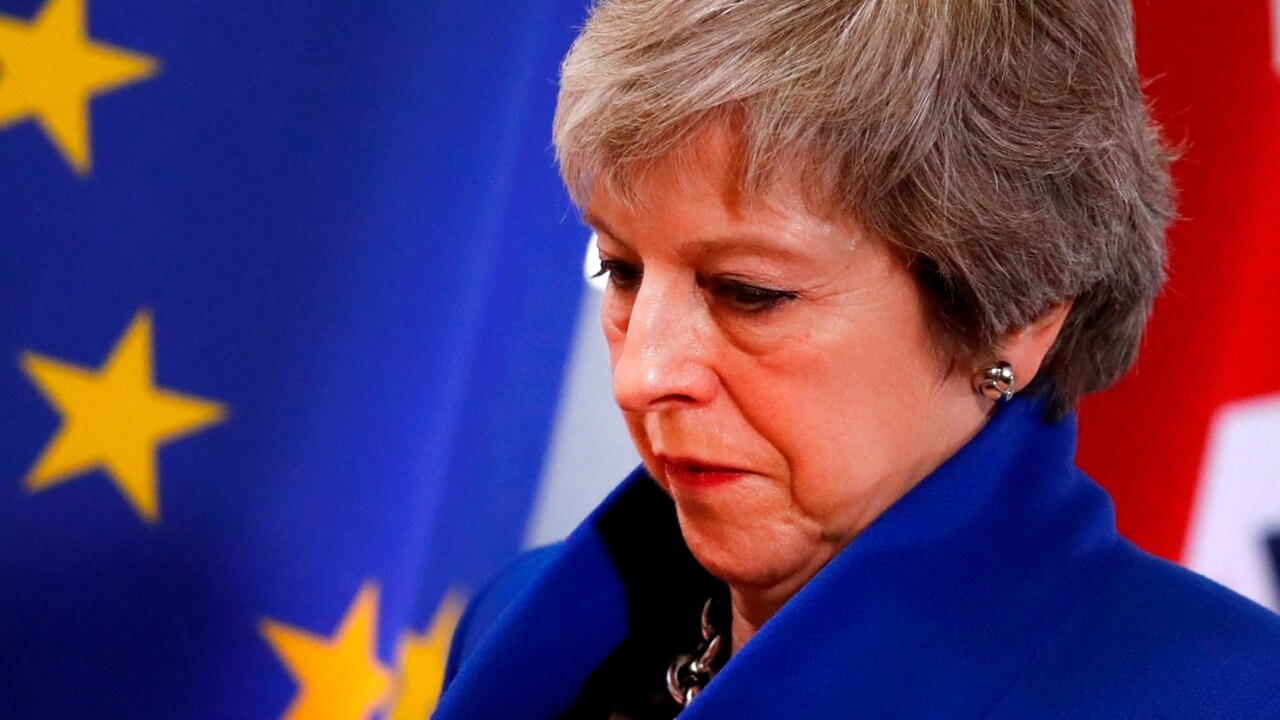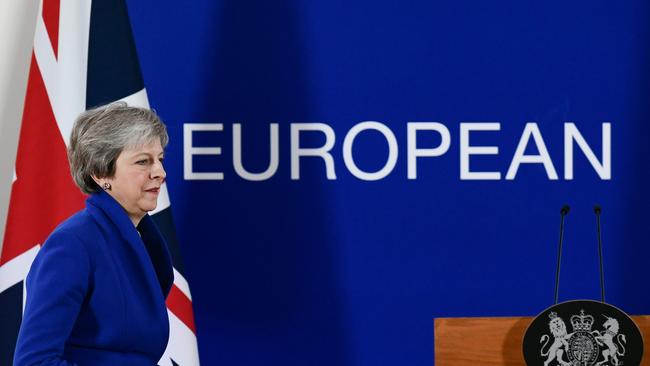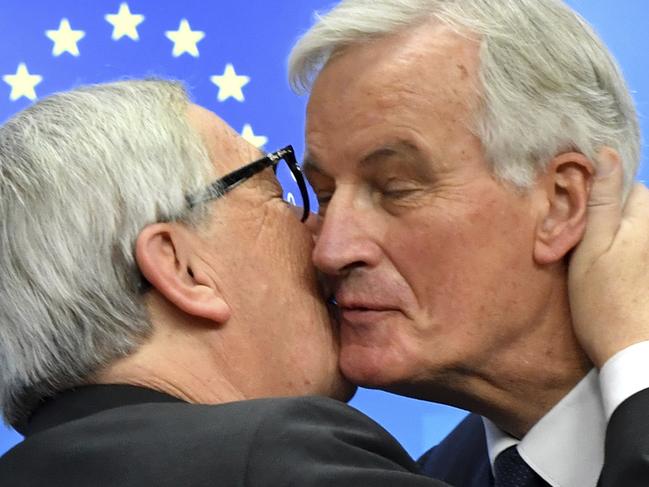Europe’s leaders rubber stamp Britain’s departure from EU in just 38 minutes
It took Europe’s leaders just over half an hour to rubber stamp Britain’s departure from the EU. Now for the British Parliament.

It took Europe’s leaders only 38 minutes to rubber stamp the terms of Britain’s departure from the EU, bringing to an end thousands of hours of tortured negotiations and 45 years of membership.
There was, one prime minister said, a “conscious decision” not to indulge in public “speculation” over the probability that the House of Commons will reject the deal.
EU leaders lined up to speak from a carefully tailored script: this is the only offer on the table and Britain cannot not expect a better one.
“There is no plan B, this is the deal on the table,” Mark Rutte, the Dutch prime minister insisted. “If anyone in the UK thinks by voting no that something better will come out of it, they’re wrong. This is the best we can get for both the EU and the UK.”
Jean-Claude Juncker, president of the European Commission, hammered the message home. “Those who think by rejecting the deal that they would have a better deal will be disappointed in the first seconds after the rejection of this deal,” he said.
Senior EU officials briefed that “the only Plan B planning is preparedness planning for a no-deal scenario”.
Michel Barnier, the EU’s lead negotiator, who has been praised by European leaders for his tireless work, said the 17 months of negotiations had been extraordinary and very difficult. “We have negotiated with the UK, never against the UK. Now it is time for everybody to take their responsibility,” he said.
The European Council “endorsement” of the withdrawal treaty and a political declaration of the future relationship between Britain and the EU was an important legal step. The agreement, in an atmosphere described by EU diplomats as “dignified, solemn and measured”, means that unless MPs reject the deal or the government asks for Brexit to be postponed then Britain will leave the EU on March 29.
If backed by MPs, the withdrawal treaty will be sent to the European parliament on December 18 for final approval early next year.
Leo Varadkar, the Irish prime minister, said that the meeting of European leaders had made a “conscious decision not to discuss what might happen if the House of Commons rejected this deal”.
Both President Macron of France and Angela Merkel, the German Chancellor, refused to entertain “speculations” that MPs might not believe the EU’s warnings that there was only one deal on the table. “The British prime minister is going to do whatever is in her power,” Mrs Merkel said.
Asked what she would do to help an embattled Theresa May get the deal through the parliament, she said dryly: “One shouldn’t do anything one hasn’t been asked for in advance.”
Behind the scenes, speculation was rife about what would happen if MPs rejected the deal in a fortnight. President Grybauskaite of Lithuania, envisaged the “scenarios” of a second referendum, new elections or a request for renegotiation. “It is far from over,” she said, breaking ranks with other leaders. “Anything could happen.”
A number of European leaders, including Mr Rutte, Mrs Merkel and Mr Macron, expressed “sadness” that they were setting the legal seal on Britain’s withdrawal. Asked whether she felt any sadness Mrs May said: “No, but I recognise that others do. I recognise some European leaders are sad at this moment, but also some people back at home in the UK will be sad at this moment.” Mr Juncker too expressed his regret but said that even after divorce, “there is, between us — something — which are the remainings of love.”

May: vote for my deal
Mrs May now launches a frantic two-week campaign today to save her Brexit deal and prime ministership by telling MPs to do their duty and support her or face going “back to square one”.
In a high-risk strategy to turn the tide of opposition in Westminster, the prime minister will then embark on a nationwide tour designed to sell her plan directly to the electorate.
Taking personal responsibility for winning round voters, she will warn her party to put aside its differences and listen to constituents who are fed up with Brexit and want to “move on”.
Failure to back the deal will create further “division and uncertainty”, she will tell the Commons.
Mrs May will hold an emergency cabinet meeting today at which she will brief ministers on her strategy to sell the deal. She will then go to the Commons and directly appeal to MPs to “listen” to their constituents and “decide what is in our national interest”.
The prime minister is expected to travel to Wales, Scotland and Northern Ireland this week for a series of events before heading to Argentina for the G20 summit next weekend. Ministers are also planning to publish Treasury estimates on the economic impact of the deal.
It has also been claimed that Mrs May is considering a television debate with Jeremy Corbyn, the Labour leader. Downing Street said this was unlikely but there had been no final decision.

Labour grass roots look at ways to force second vote
Labour members could force an emergency conference in an attempt to compel the party to back a second Brexit referendum.
A motion being circulated among constituency Labour Parties calls for a conference at which the sole motion on the agenda would be that “the citizens of the UK must have the final say through a People’s Vote” with Remain as an option, The Observer reported.
Under Labour rules, special conferences can be called at ten days’ notice, and all delegates from this year’s annual conference in Liverpool would be entitled to attend. The most recent special conference was called by the former party leader Ed Miliband in 2014 to approve changes in the party’s leadership election rules, which paved the way for Jeremy Corbyn’s rise the following year.
Mr Corbyn yesterday reiterated Labour’s vow to vote against Theresa May’s deal in the Commons. “This is a bad deal for the country,” he said. “It is the result of a miserable failure of negotiation that leaves us with the worst of all worlds.” Lisa Nandy, the Labour MP for Wigan who had previously suggested she might back a Brexit deal, said she would not vote for “26 pages of virtually nothing” and accused Mrs May of making “no attempt to reach out to Labour MPs like me”.
Caroline Flint, the Labour MP for Don Valley, still appeared open to backing the deal, writing on Twitter: “There is an 11th-hour attempt to overturn the result of the EU Ref 2016. Even if it means siding with Johnson, Rees-Mogg et al to stop any deal and leave us crashing out. The consequences are dire and a second Ref will lead to far-right resurgence, discord and distrust.”
John McDonnell, the shadow chancellor of the exchequer, met Tom Baldwin, who worked for Mr Miliband, and Alistair Campbell, who worked for Tony Blair, in the Commons on Thursday. They are campaigning for a second referendum. Mr McDonnell said that he met them “simply to map out what options are available to us”.
THE TIMES


